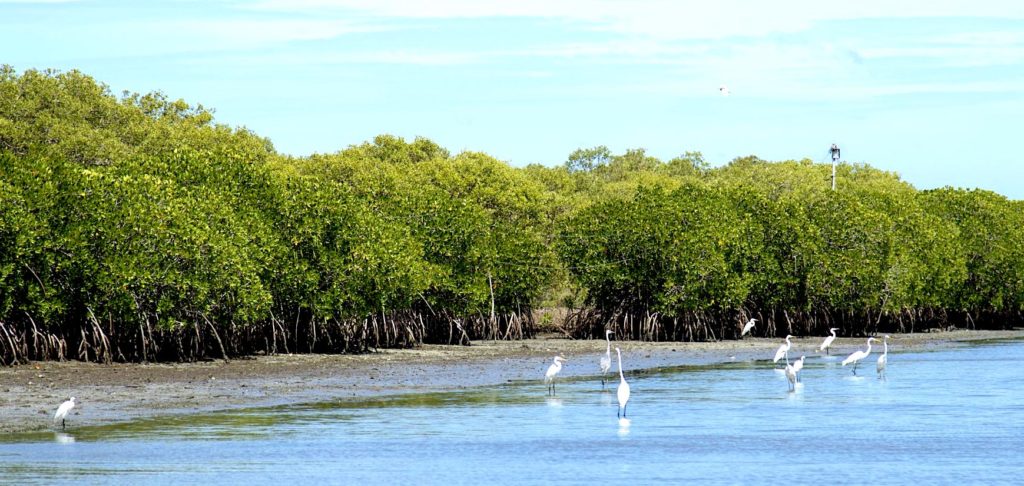Photo courtesy of EFL
In February this year Sri Lanka received an UN award in recognition of its efforts to rebuild and restore its mangrove ecosystems, highlighting best practices and methodologies that could serve as a framework for future success across the world.
Just three months later, the Minister of Wildlife and Forest Resources Conservation Pavithra Wanniarachchi issued an extraordinary gazette degazetting at least 1,000 hectares of an important and unique mangrove system on the Mannar coast.
“While previous gazettes have described the exact area, the recent gazette does not state how many hectares will be degazetted, clearly indicating that this is a destructive and ambiguous mission,” said co-founder of Rainforest Protectors Jayantha Wijesingha.
“This degazetting shows that politicians have not given up working with big companies to destroy protected areas. New areas are now being degazetted in addition to areas that were traditionally used for farming,” he pointed out.
The Wedithalathivu Nature Reserve is a rich and vibrant ecosystem consisting of mangroves, tidal or mudflats, salt marshes, seagrass beds and coral reefs, which support the livelihoods of fishermen in the area. The mangrove system is unique because it is the only one in Sri Lanka in which the mangroves grow on the coast, facing the sea, providing a vital shield from cyclones, storm surges and tsunamis and playing a critical role in mitigating climate change.
In 2016, the 29,180 hectare Wedithalathivu Nature Reserve was declared by an extraordinary gazette. The area was identified as requiring protection through a Strategic Environmental Assessment (SEA). The nature reserve covers a large extent of ocean, protecting sea grass habitats that are crucial for dugongs, as well as some terrestrial areas, which protect the mangrove ecosystem, according the Environment Foundation Limited (EFL).
In 2017, the National Aquaculture Development Authority (NAQDA) has developed a proposal for a 1,000 hectare Aquaculture Industrial Park that would allow private parties to farm marine fin fish, crabs and exotic species of shrimp. However, due to an outcry from environmentalists and opposition from the community, the plan was shelved.
Failed prawn farms in the Puttalam district have resulted in barren lands and have caused much damage to the ecosystem with chemicals and other products being discharged into the water.
“Prawn aquaculture has destroyed more than 3,000 hectares of mangrove forests in the country. Fishermen have lost fish catch because there are no breeding grounds for shallow water fish. Chemicals from the aquaculture farms have polluted coastal areas so fishermen are facing problems. Coastal lagoon areas have become dead areas,” Mr. Wijesingha said.
Dr. Sevvandi Jayakody from the Wayamba University said that pesticides, antibiotics, chlorine and other water quality regulating chemicals, as well as fecal matter from farmed species would be discharged into the ocean. Integral marine ecosystems such as mangroves, coral reefs and sea grass beds that are extremely sensitive to nitrites, nitrates and phosphates would be adversely affected by the change in water composition.
The degazetting of the 1,000 hectares points to the fact that this proposal is once again being considered for implementation despite the adverse consequences to the environment.
“Aquaculture farming systems have proven to be disastrous to corals and sea grasses. Coral bleaching is destroying corals while whales and dolphins are impacted when chemical balance is disrupted. Fish will also move away,” Mr Wijesingha said. “Without looking at tourism opportunities, we are destroying the area and causing an environmental disaster. Not only new tourism but even existing tourism will collapse.”
He pointed out that despite President Ranil Wickremesinghe’s emphasis on mitigating climate change and creating an environmentally sustainable country, his actions were proving to be achieving the opposite because he has appointed unsuitable ministers and officials who participated in the destruction of the environment instead of protecting it.
“It is a clear indication that the president has no respect for environmentally protected areas or environmental conservation and no respect for regulations and regulatory requirements. He has no concern for migratory birds or biodiversity or fresh water or ecosystems; it points to the hypocrisy of his climate change office and its advisors,” Mr Wijesingha said.
